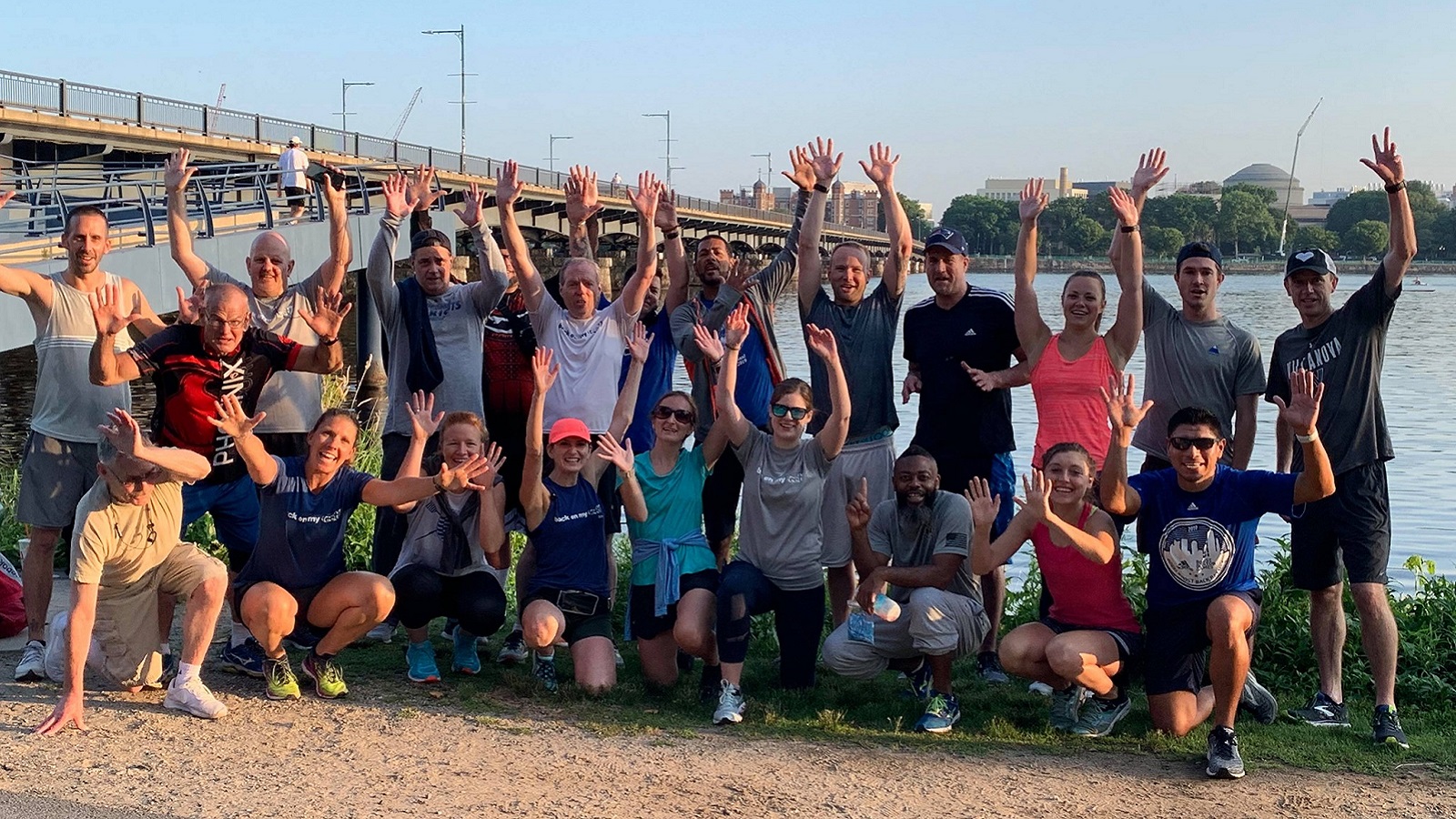It’s 5:30 am, and while most of the world may still be sleeping, our community comes together, greeting each other with hugs and high fives. We come from all walks of life, running together to get in our morning miles. Our community shows up rain or shine, on the darkest of winter mornings and the brightest of summer days, knowing that by just showing up, we are helping each other put one foot in front of the other, pushing toward a brighter future.
What is Back on My Feet?
Back on My Feet (BoMF) is a national organization operating in 13 cities across the United States that works to combat homelessness and addiction through the power of running, community support, essential employment, and housing resources. At BoMF, we work with a variety of homeless and transitional living facilities, recovery, and re-entry programs in each of our chapter cities. Members (i.e. individuals experiencing homelessness) start with the commitment to run three mornings per week, and with this commitment, BoMF also offers a workforce development program, working with members individually and in group settings to achieve independence and self-sufficiency.
This unique model firmly believes that if you first restore confidence, strength, and self-esteem, individuals are better equipped to tackle the road ahead. Many of our BoMF members struggle with mental health challenges, especially posttraumatic stress disorder (PTSD), depression, and anxiety. We’ve seen, though, that the development of healthy, weekly routines that include physical activity and accountability (BoMF requires members maintain 90% attendance at morning runs), this has the powerful potential to contribute significantly to our members’ mental health.
“I can feel the difference in my anxiety since joining Back on My Feet. Running helps me start my day out on a really positive note.” – Keyana, BoMF Member
Further, the community aspect allows members to first achieve small wins—moving from walking to running, completing their first timed mile or 5K race. These small successes result in feelings of accomplishment that many members haven’t felt in a while. Members use these small wins to build and impact other areas of their lives, including finding sustainable employment and achieving self-sufficiency.
BoMF Response to COVID-19
Due to the COVID-19 pandemic, Back on My Feet has had to pivot a program whose success is based on face-to-face interactions, group activities, and community support to an online community. We’ve moved from at least three face-to-face interactions per week to building a virtual community in its place. BoMF members and alumni (individuals who have found sustainable employment and housing) who’ve relied on our weekly in-person routine have been forced to develop further mental strength and accountability to stay engaged and remain active. Throughout the pandemic, we have engaged BoMF members and volunteers in morning circle-ups via Zoom, weekly challenges on Facebook, and stayed in contact via emails, text messages, and phone calls. Members and volunteers alike have continued with our Monday, Wednesday, Friday running routine, and we encourage all team members to share photos from their runs and answer “questions of the day” in order to keep the BoMF spirit alive.
Physical distancing measures prevent the spread of coronavirus, though for our community, the isolation that results from these measures can lead to downturns in mental health. Over 78% of our members struggle with substance use disorders and are currently in recovery, and research shows that increased stress and isolation can lead to higher rates of relapse. Essentially, isolation is the antithesis of our program.
It is said that in times of crisis, it’s important to keep our community close. Throughout the pandemic, I’ve been humbled to see our members and volunteers step up to transition all morning circle-ups, workouts, and workforce development workshops into virtual events. Many BoMF members have completed online training programs, secured new housing, and stepped into roles as essential workers. Our members have shown resilience in the face of difficult social, emotional, physical, and economic circumstances, banding together to support one another within their facilities, as well as sharing inspirational videos of their runs along our normal routes—reminding our BoMF community that we’re always together, despite the physical distance.
Our community has overcome seemingly unsurmountable obstacles throughout the COVID-19 pandemic and supported each other in ways I could not have anticipated. This truly demonstrates the impact of community support as individuals navigate the obstacles of homelessness, addiction, and mental health—the mission of Back on My Feet.
**Feature photo provided and used with permission from author Jen Hyde & Back on My Feet.
Interested in contributing to the Harvard Primary Care Blog? Review our submission guidelines
Interested in other articles like this? Subscribe to the Center's newsletter
--

Jen Hyde, MS, is the Program Director for the Back on My Feet (BoMF) Boston Chapter. Jen is a strong advocate for using the power of sport for social change. She has spent the past 15 years working with marginalized communities, using the power of sport to level the playing field and create inclusive communities.
- Share
-
Permalink


